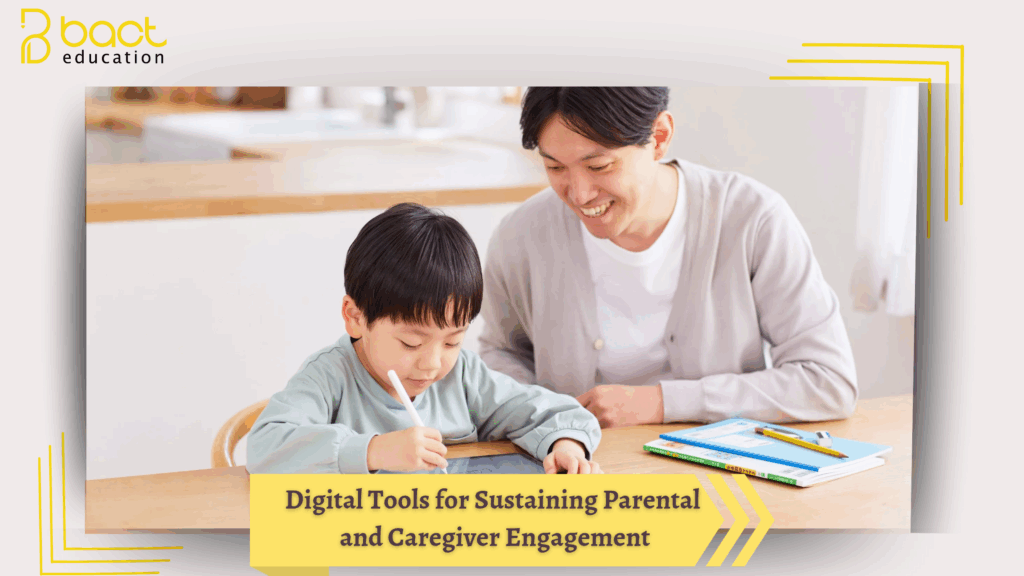Digital Tools for Sustaining Parental and Caregiver Engagement
in the Early Years
The early years of a child’s life are often described as the “golden years,” a unique window of opportunity in which the foundations of personality, cognition, and emotional wellbeing are laid. During this critical stage, parents and caregivers play the central role, providing children with security, affection, and the stimulation they need to explore and grow. In today’s world, however, parenting and caregiving do not unfold in isolation; technology has become an integral part of daily life. Digital tools, once associated merely with entertainment, have now evolved into powerful instruments that can enhance family engagement and strengthen the bridge between home and educational settings.
One of the most visible contributions of digital technology lies in interactive educational applications designed for early childhood. These apps have transformed learning into a playful, engaging experience. No longer does a child simply listen passively to a story—today, they can touch the screen to bring characters to life or choose alternative endings, while a parent sits nearby reading aloud or guiding the interaction. This blending of digital engagement and human interaction creates a rich learning experience that stimulates imagination, develops language, and strengthens the child–parent bond.
Equally important are the digital platforms that connect homes with preschools and childcare centers. Teachers can now share daily snapshots of a child’s participation in group activities, or brief reports on their social and academic progress, all accessible to parents on their phones in real time. For families, this fosters transparency and trust in the institution, while also enabling parents to reinforce at home the skills and values being cultivated in the classroom. The child, in turn, feels recognized and valued, knowing that both caregivers and educators are jointly invested in their growth.
Virtual meetings have also reduced barriers to parental involvement. Parents who once struggled to attend conferences due to work schedules or distance can now meet teachers or specialists from their office or even while traveling. Similarly, webinars and online workshops provide parents with access to expert advice on positive parenting strategies, language development, or behavior management. In this way, digital platforms are not only improving communication but also democratizing access to knowledge and training for all families.
Another significant innovation is the use of digital growth records. Parents can now document a child’s developmental milestones—first smile, first steps, first words—through apps that store photos, notes, and even health data such as height and weight. Beyond serving as a treasured family archive, these records give educators and pediatricians valuable insights into the child’s developmental trajectory, allowing for early detection and intervention when needed.
On a more social level, digital communities for parents and caregivers have created supportive spaces where experiences can be shared and struggles normalized. A parent dealing with tantrums, sleep difficulties, or picky eating can connect instantly with others facing similar challenges. This sense of solidarity helps reduce stress and fosters resilience. Still, critical awareness is essential: not all online advice is accurate, and families must remain discerning in choosing which recommendations to follow.
Despite these advantages, digital engagement is not without challenges. Excessive screen time risks displacing the very interactions children need most—face-to-face conversations, physical play, and the emotional reassurance of a parent’s presence. Concerns around privacy and data security also require careful attention, especially when sharing images or personal information about children online.
Ultimately, the true value of digital tools lies not in replacing human connection but in amplifying and extending it. When parents and caregivers use these tools thoughtfully and in balance, they become enablers of meaningful engagement: bridging distances, supporting learning, and providing opportunities to celebrate milestones both big and small. Yet at the heart of a child’s development remains what no app or platform can replicate: the warmth of a loving embrace, the reassurance of a familiar voice, and the daily presence of caregivers who show unwavering love and attention.
In this context, BACT plays a pioneering role in integrating digital tools into early childhood settings. The institute offers specialized training programs and diplomas such as CACHE Diplomas, designed for teachers and caregivers. These programs not only provide theoretical knowledge about child development and early years’ needs but also focus on practical training in how to effectively use digital applications and platforms to sustain parental and caregiver engagement, and to strengthen communication between home and early years settings. BACT places particular emphasis on empowering educators to select and apply appropriate technological tools in ways that balance the benefits of innovation with the essential value of human interaction. In doing so, the institute contributes to preparing a new generation of educators capable of harnessing digital resources to support meaningful partnerships with families during the crucial early years of a child’s life.

